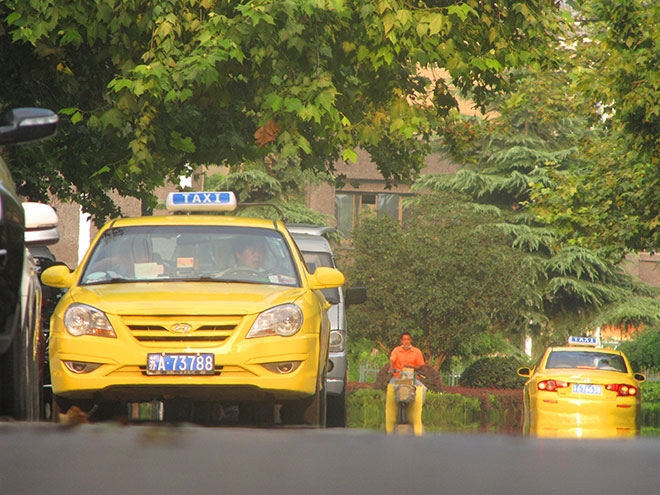The introduction of the “double fee system” for taxis is coming in June 2014.With new apps, payment methods and pricing system, the Nanjing Taxi Industry is in upheaval.
In Beijing, where horrendous traffic jams are the daily norm, it was introduced years ago; the “double fee system” wherein passengers pay not only for the distance of a drive but also for its duration. Discussion whether to introduce a low-speed and waiting fee to the taxi system in Nanjing has been going on for quite some time; ten years to be exact.
Since 2004 taxi drivers in Nanjing have been asking for a revision of the current system that takes into account the financial loss the ever-growing wait among a sea of immobile cars brings. In April 2012 a proposal for the double fee system was submitted, which suggested that the additional costs would only be applicable during rush hour from 7am to 9am and again from 4pm to 7pm each day and when the car’s speed drops below 12km/h. In this case an additional fee equal to the kilometre pricing which currently amounts to ¥2.4 per kilometre is added to the bill. While the last two years have seen Nanjingers spared of the extra cost, come June the period of grace will finally be over. Whether the actual system will follow the original proposition or be amended is at this point a matter of speculation.
The introduction of the new way of calculating might help alleviate the disappearance phenomenon where taxis do not enter the city centre, where they would be most needed, during rush hour because it would lose them time and money. However, this is not the only reason for an increased lack of available taxis on Nanjing’s streets.
The industry in Nanjing is going through a transformation with the introduction of apps such as Didi Dache (嘀嘀打车), which on the surface are aimed at simplifying the search for a car by sending out a message to all drivers in the vicinity about where the passenger would like to go. The app has been gaining immense popularity over the past year but at the same time has brought with it two consequences; exclusionism and a price hike. Potential passengers who do not use the app now find themselves staring at hordes of empty cars passing by who are on a duty call from an app user. If you are not using the mobile technology the search for a taxi has become very time consuming the more users join the system. Furthermore, the app has a built-in auctioning system whereby users can chose to add ¥5, ¥10 or even ¥20 to their cab fare as an incentive for the drivers to pick them. When app users require a taxi during rush hour, it is now impossible to find willing cabbies to take you for a ride if you do not offer additional money; often even the extra ¥5 won’t cut it as the Shifu’s become more picky.
On a personal level, the app has had a strong effect on the jobs of the drivers. With the constant influx of potential customers in form of noisy announcements, some drivers find that they are now unable to enjoy their work as much as they used to. Mr. Song, a Nanjing taxi driver, explains: “You constantly have to listen to the app, which makes conversation with your passengers impossible, that is a huge shame.” One only needs to take a taxi nowadays to understand what Mr. Song is talking about. The incessant stream of talking from the app does not only make conversation extremely difficult, it also makes it more difficult to concentrate. One cannot help but wonder whether this might even go so far as to negatively influence traffic security and cause accidents.
While apps such as these are contributing to a pricing crisis many are questioning what the business plan is behind a free app that pays cabbies to use it on a continuous basis. The developer behind the software is Tengxun, the masterminds behind QQ and Wechat. The company’s aim is to promote their Wechat-based payment system, an option that became available with one of the most recent updates to Didi Dache. Until today paying virtually was even encouraged by the producer through a ¥10 reward for payment through the communication software. From today onwards, this amount has been reduced to ¥5, making it increasingly obvious that Tengxun are attempting to create a market necessity to use the app and their payment method in the long run. The coming year will show whether enough dependency has been created for this plan to pan out or whether the taxi app will join the ranks of long forgotten software.
With discussion about the double fee fare and Tengxun trying to take over the world of vehicular transport, the Nanjing taxi industry finds itself in a tumultuous state. With all these changes brooding the one certainty is that the passengers will be the ones to pay the price.
Correction: Despite reports suggesting the introduction of the double fee system, at this point (April 2015) the regulation has not been introduced.









